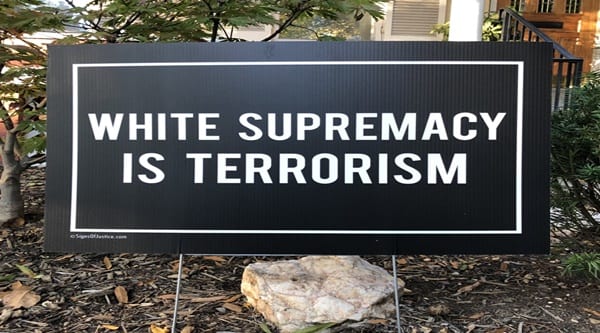Rene Girard has a prophetic warning in his book Battling to the End about the West’s fight against Islamic jihadists:
The West is going to exhaust itself in its fight against Islamic terrorism, which Western arrogance has undeniably kindled.
That Western arrogance was on display last weekend on Real Time with Bill Maher. The tense debate about Islam between Bill Maher, Sam Harris, and Ben Affleck has been shared multiple times over social media and provides a case study in Girard’s mimetic theory.
One element that mimetic theory illuminates in this discussion of Islam is the scapegoat mechanism. Scapegoating is a non-conscious way of reinforcing a group’s relationship by blaming another group of people for our problems. The scapegoating mechanism is non-conscious because we always think that we are innocent and that our scapegoats are guilty. The video above shows a great example of the scapegoating mechanism when it comes to Islam. It’s about Islamaphobia, or an irrational fear of Islam. Here’s how the debate begins:
Harris: The crucial point of confusion is that we have been sold this meme of Islamaphobia where every criticism of the doctrine of Islam gets conflated with bigotry toward Muslims as people and that is intellectually ridiculous.
Affleck: …So you are saying that Islamaphobia is not a real thing?
Maher: Well, it’s not a real thing when we do it…It truly isn’t.
Harris: …Ben, we have to be able to criticize bad ideas.
Affleck: Of course we do!
Harris: But Islam is the mother lode of bad ideas at the moment.
Maher: That’s just a fact.
Affleck: That’s not a fact! It’s an ugly thing to say.
This debate about Islam is ubiquitous in the West and I think it points to Girard’s warning against Western arrogance. Sam Harris is very careful to say that he isn’t suffering from Islamaphobia when he critiques Islam. Maher even states that when they critique Islam it “truly isn’t” being Islamaphobic. But then Harris goes on to say that “Islam is the mother lode of bad ideas at the moment” and Maher reinforces the point by saying, “That’s just a fact.”
Personally, I agree that we need to criticize bad ideas, but to say that “Islam is the mother lode of bad ideas” and deny that you are Islamaphobic is, to use Harris’s own words, intellectually ridiculous. It’s an act of scapegoating Islam and Muslims.
And, as with all scapegoating, it is non-conscious. Maher and Harris genuinely believe that when they criticize the totality of Islam with a broad brushstroke that they aren’t being Islamaphobic. In fact, they believe that they are on the side of justice and peace and any fear of Islam is completely rational.
Maher and Harris are involved in double speak. They claim that they are just criticizing Islam and that they aren’t criticizing Muslims. But near the end of the debate, Harris states that the only good Muslim is one who doesn’t take Islam seriously. “There are hundreds of millions of Muslims who are nominal Muslims, who don’t take the faith seriously, who don’t want to kill apostates, who are horrified by ISIS and we need to defend these people, prop them up and let them reform their faith.”
That statement is indicative of Western arrogance that alienates Muslims. Those hundreds of millions of Muslims who are horrified by ISIS, who don’t want to kill apostates, who stand up for the weak, poor, and marginalized, don’t do those things in spite of their faith. They do them because of their faith. But when the rhetoric of Islamaphobia tells us that Islam is necessarily violent, the implication is that Muslims are necessarily violent. Yet, as Ben Affleck points out, we have killed many more Muslims than Islamic terrorists have killed Muslims. Stephen Walt, professor of international relations at Harvard University, makes a similar observation when he asked, “How many Muslims has the US killed in the last 30 years?” In wars and violent conflicts during that period, Walt found that Muslims have killed about 10,325 Americans, whereas the US has killed 288,000 Muslims.
Every death due to violence is one death too many, but the drastic disproportion of that comparison reveals an important aspect of scapegoating. When we scapegoat Islam for being violent, we become blind to our own violence. Despite the overwhelming facts of our own destructive violence, the rhetoric of Islamaphobia would have us believe that we who live in a secular society aren’t violent. It’s those theocratic Muslims who are violent!
Now, the fact that violence is found in any religion should not surprise us. I appreciate that Maher and Harris are equal opportunity critics of religious violence. There is a human element to every religion and we humans have a tendency to be violent with one another. Whether we justify violence in the name of God, religion, justice, peace, or power really doesn’t matter. What matters is that, no matter how we justify it, violence is a bad idea because it leads to a cycle of retributive violence. The problem Maher and Harris face is that they can’t see that their blanket critique of Islam is itself violent.
What should surprise us is when we find a critique of violence within a religion. And that’s what we find with Islam. Imam Feisal Abdul Rauf is one of America’s most outspoken Muslims. He begins his book What’s Right with Islam by claiming that Judaism, Christianity, and Islam share the two great commandments. These commandments are familiar enough – the first is to love God and the second is to love our neighbors. But Imam Rauf explains the second commandment from an Islamic perspective. He claims that one of the core Islamic values is to “To love our neighbors—that is, our fellow human beings—regardless of race, religion, or cultural background as we love ourselves.”
Love runs throughout the religion of Islam and it provides an internal critique of hatred and violence. While not a pacifist, Imam Rauf claims that violence is not in line with the ethic of love that undergirds Islam. He states in his book that, “To battle the evil of others by responding in kind and exhibiting equally violent aggressive behavior is to flout the very ethic of our religious traditions.”
I agree with Bill Maher and Sam Harris that we have to criticize bad ideas. But the “mother lode of bad ideas” doesn’t come from Islam. That’s an arrogant claim that will only kindle the spirit of violence and scapegoating in us. The “mother lode of bad ideas” is scapegoating violence.
The best alternative to the “mother lode of bad ideas” is not more blaming and scapegoating. Rather, it’s to follow in the tradition laid before us by the Jewish, Christian, Islamic religions that commands us to “To love our neighbors—that is, our fellow human beings—regardless of race, religion, or cultural background as we love ourselves.”











